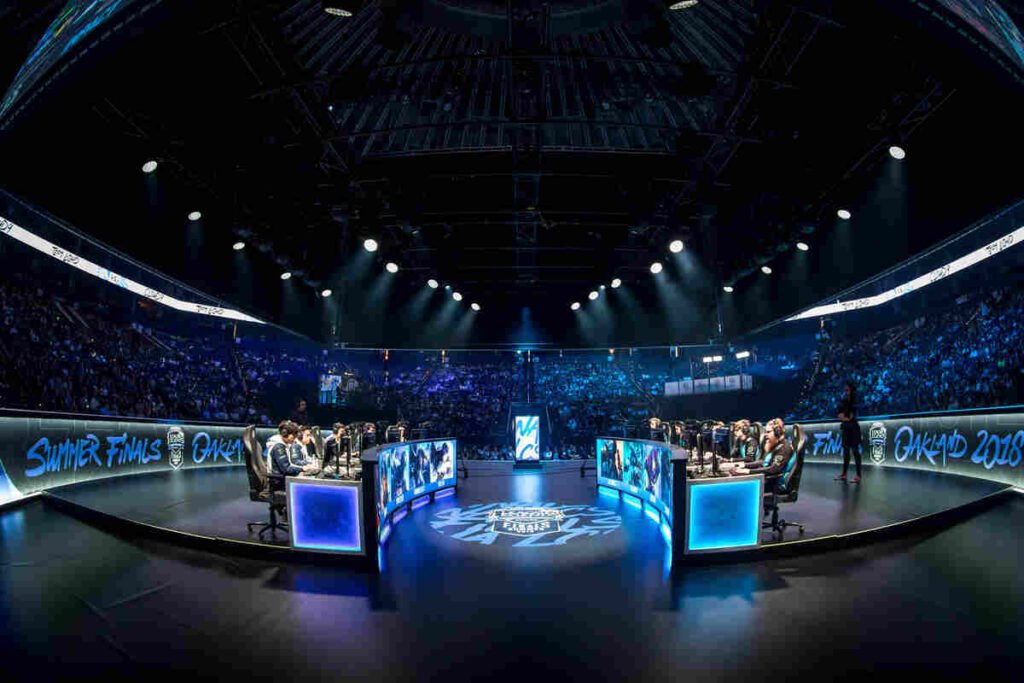Esports Tournaments: The Thrilling World of Competitive Game

Esports tournaments have emerged as a groundbreaking phenomenon in the world of entertainment, captivating millions of fans across the globe. These competitive gaming events bring together elite players who battle it out in popular video games, showcasing their skills and strategies to massive audiences. The rise of esports has transformed gaming into a professional sport, complete with major sponsorships, media coverage, and dedicated fanbases. In this article, we will delve into the fascinating world of esports tournaments, exploring their evolution, structure, major events, and the broader impact on culture and society.
The Evolution of Esports Tournaments
The journey of esports from informal, grassroots competitions to internationally recognized events is a testament to the growth of digital entertainment. The early days of competitive gaming can be traced back to the 1970s and 1980s, with arcade game competitions and local LAN (Local Area Network) parties.
Early Beginnings and Milestones
Games like “StarCraft,” “Counter-Strike,” and “Warcraft III” were among the first to foster competitive scenes, with players organizing online tournaments and building communities around their favorite titles. The launch of streaming platforms like Twitch and YouTube further propelled the popularity of esports, making it possible for fans to watch live matches and interact with their favorite players in real time. The introduction of high-speed internet and advanced gaming technology also played a crucial role in enhancing the overall experience of competitive gaming.
The Rise of Professional Leagues
As the popularity of esports grew, so did the formation of professional leagues and organizations. The establishment of the Electronic Sports League (ESL) in 2000 marked a significant milestone in the professionalization of esports. ESL began hosting large-scale tournaments with substantial prize pools, attracting top-tier talent from around the world. Other notable organizations, such as Major League Gaming (MLG) and DreamHack, followed suit, further solidifying the foundation of competitive gaming as a legitimate sport.
Esports tournaments: Key Esports Titles and Genres

Esports tournaments feature a diverse range of games across various genres, each with its unique gameplay mechanics and competitive appeal. Understanding the key titles and genres is essential to grasping the scope of esports.
Multiplayer Online Battle Arena (MOBA)
One of the most popular genres in esports is the Multiplayer Online Battle Arena (MOBA). Games like “League of Legends” and “Dota 2” dominate this category, with both titles having a massive following and hosting some of the most prestigious tournaments in the esports calendar. MOBA games require strategic thinking, teamwork, and individual skills, making them highly engaging for both players and spectators.
Esports tournaments: First-Person Shooter (FPS)
First-person shooter (FPS) games are another staple in the esports scene. Titles such as “Counter-Strike: Global Offensive” (CS) and “Overwatch” are renowned for their fast-paced action and tactical gameplay. FPS tournaments often attract large audiences due to the high stakes and thrilling nature of the matches, where precision and reflexes are key to victory.
Battle Royale and Fighting Games
Battle Royale games like “Fortnite” and “PlayerUnknown’s Battlegrounds” (PUBG) have also made a significant impact on esports. These games pit numerous players against each other in a last-man-standing format, providing intense and unpredictable competitions. Additionally, fighting games like “Street Fighter” and “Super Smash Bros.” have long been a part of the esports ecosystem, with dedicated communities and exciting tournaments.
Major Esports Tournaments and Leagues
Esports tournaments have grown to become grand spectacles, rivaling traditional sports events in terms of scale and production value. Some of the most prominent tournaments and leagues have become annual highlights for the esports community.
The International
“The International” is the premier tournament for “Dota 2” and is known for its enormous prize pool, which is crowdfunded by the game’s community. Held annually, The International attracts the best teams from around the globe, competing for millions of dollars in prize money and the coveted Aegis of Champions. The event is celebrated for its high-quality production, dramatic matches, and passionate fanbase.
Esports tournaments: League of Legends World Championship
The “League of Legends World Championship” is another marquee event in the esports calendar. Hosted by Riot Games, this tournament brings together the top teams from various regional leagues to compete for the title of world champion. The event features elaborate opening ceremonies, extensive media coverage, and a global audience that tunes in to watch the best League of Legends players in action.
ESL One and DreamHack
ESL One and DreamHack are two major tournament organizers that host multiple esports events throughout the year.”Dota 2,” offers large prize pools and attracts top-tier teams. DreamHack, known for its massive gaming festivals, hosts a variety of tournaments across different genres, providing a platform for both professional and amateur players to showcase their skills.
Esports Tournaments: The Role of Sponsorship and Media
Sponsorship and media coverage play a crucial role in the success and growth of esports tournaments. The involvement of major brands and broadcasters has brought significant financial support and mainstream visibility to the esports industry.
Sponsorship Deals
Esports teams and tournaments often secure sponsorship deals with prominent companies, including technology firms, energy drink brands, and apparel manufacturers. These sponsorships provide essential funding for events and players, allowing the industry to thrive and expand. Brands like Intel, Red Bull, and Nike have become key sponsors in esports, leveraging the growing popularity of competitive gaming to reach a young and engaged audience.
Esports Tournaments: Media Coverage and Broadcasting
Media coverage of esports has evolved significantly over the years. Traditional sports networks, such as ESPN, have begun to broadcast esports events, recognizing their growing appeal. Additionally, streaming platforms like Twitch, YouTube Gaming, and Facebook Gaming have become primary hubs for esports content, offering live broadcasts, replays, and exclusive behind-the-scenes footage. This extensive media presence has helped elevate esports to new heights, attracting millions of viewers worldwide.
Esports Tournaments Structures
Esports tournaments come in various formats and structures, each designed to provide a fair and competitive environment for players. Understanding these structures is essential to appreciating the intricacies of esports competitions.
Single-Elimination Tournaments
In a single-elimination tournament, players or teams are eliminated after a single loss. This format is straightforward and creates a high-stakes atmosphere, as every match could be the last for the participants. While single-elimination tournaments are quick and decisive, they can be unforgiving, as one mistake can result in elimination.
Double-Elimination Tournaments
Double-elimination tournaments offer a more forgiving structure, allowing players or teams to continue competing after one loss. In this format, participants are moved to a “losers’ bracket” after their first defeat, giving them a second chance to progress through the tournament. This structure ensures that the best teams have the opportunity to recover from an early loss and still contend for the championship.
Esports Tournaments: Round-Robin and Swiss Systems
Round-robin and Swiss systems are commonly used in esports tournaments to ensure that each team or player competes against multiple opponents. In a round-robin format, every participant faces every other participant at least once, providing a comprehensive assessment of their skills. The Swiss system, on the other hand, pairs participants with similar records against each other in each round, creating a balanced and competitive tournament progression.
Player Profiles and Stories
Behind every esports tournament are the players who dedicate their lives to mastering their games and competing at the highest level. These athletes have unique stories and experiences that highlight their dedication, passion, and resilience.
The Rise of Esports Stars
Esports has produced numerous stars who have become household names within the gaming community. Players like Lee “Faker” Sang-hook in “League of Legends” and Johan “N0tail” Sundstein in “Dota 2” have achieved legendary status due to their exceptional skills and consistent performances in major tournaments. These players often have large followings on social media and streaming platforms, where they engage with fans and share their gaming journeys. “Esports Tournaments”
Esports Tournaments: Challenges and Triumphs
The path to becoming a professional esports player is fraught with challenges. Players must invest countless hours in practice, often at the expense of personal and social activities. They face intense competition, and the pressure to perform can be overwhelming. Despite these challenges, many players find fulfillment and success in esports, achieving their dreams of competing on the global stage and winning prestigious titles.
Esports Tournaments: Training and Preparation for Tournaments
The level of preparation required for esports tournaments is akin to that of traditional sports. Professional players follow rigorous training regimens to hone their skills and stay competitive.
Practice Schedules
Top esports players typically adhere to structured practice schedules that include individual skill drills, team practice sessions, and strategy discussions. These sessions are designed to improve mechanical skills, such as accuracy and reaction time, as well as teamwork and communication. Players often spend upwards of 8-10 hours a day practicing, ensuring they are in peak condition for tournaments.
Esports Tournaments: Mental and Physical Fitness
Maintaining mental and physical fitness is crucial for esports athletes. Mental resilience is essential to handle the stress and pressure of high-stakes competitions. Players work with sports psychologists to develop coping strategies and improve focus. Physical fitness is also important, as prolonged periods of gaming can lead to health issues. Regular exercise, a balanced diet, and proper ergonomics are essential components of a professional player’s routine.
The Business of Esports
Esports has evolved into a multi-billion-dollar industry, with various revenue streams and business opportunities. Understanding the business side of esports provides insight into its rapid growth and sustainability. “Esports Tournaments”
Revenue Streams
Esports generates revenue from multiple sources, including sponsorships, media rights, merchandise sales, ticket sales for live events, and in-game purchases. Sponsorship deals with major brands provide significant funding for teams and tournaments, while media rights agreements with broadcasters and streaming platforms offer substantial revenue streams. Additionally, the sale of team merchandise and in-game items contributes to the overall financial ecosystem of esports.
Esports Tournaments: Team Management and Organization
The management and organization of esports teams are critical to their success. Professional teams operate similarly to traditional sports organizations, with dedicated staff for coaching, analysis, marketing, and administration. Effective team management ensures that players have the necessary resources and support to perform at their best. This includes providing training facilities, mental health support, and logistical arrangements for travel and accommodation during tournaments.
Esports Tournaments: Technology and Infrastructure
The technological advancements and infrastructure required for hosting esports tournaments are pivotal to their success. High-quality equipment, reliable internet connections, and state-of-the-art venues contribute to a seamless and engaging experience for players and spectators alike.
Gaming Hardware and Software
Professional esports competitions rely on cutting-edge gaming hardware and software to ensure optimal performance. High-refresh-rate monitors, mechanical keyboards, precision mice, and powerful gaming PCs are standard equipment for esports athletes. Additionally, game developers continuously update their titles to enhance gameplay, fix bugs, and introduce new content, keeping the competitive scene dynamic and exciting.
Esports Tournaments: Venues and Online Platforms
Esports tournaments are held in various venues, from massive arenas that can accommodate thousands of spectators to smaller, intimate settings. Iconic venues like the Staples Center in Los Angeles and the Mercedes-Benz Arena in Shanghai have hosted major esports events, providing an electrifying atmosphere for fans. During the COVID-19 pandemic, many tournaments shifted to online platforms, demonstrating the flexibility and resilience of the esports industry.
Esports and the Global Audience
The global reach of esports is one of its most remarkable aspects, with fans and players from all corners of the world coming together to celebrate their shared passion for gaming.
Diverse Fanbase
Esports has a diverse and inclusive fanbase that spans different ages, genders, and cultures. This global audience is connected through a shared love for competitive gaming, creating a sense of community and belonging. The accessibility of online streaming platforms allows fans to watch live matches, interact with players, and participate in discussions, regardless of their geographic location.
Cultural Impact
Esports has had a significant cultural impact, influencing trends in fashion, music, and entertainment. The popularity of esports has led to collaborations with well-known brands and artists, further integrating gaming into mainstream culture. Esports events often feature musical performances, fashion showcases, and other entertainment segments, enhancing the overall experience for fans. “Esports Tournaments”
Esports Tournaments: Health and Well-being of Esports Athletes
The health and well-being of esports athletes are critical to their performance and longevity in the industry. Addressing both physical and mental health challenges is essential to ensuring a sustainable career in competitive gaming.
Physical Health Concerns
Prolonged periods of gaming can lead to various physical health issues, such as repetitive strain injuries, eye strain, and poor posture. Esports organizations prioritize the physical health of their players by providing ergonomic equipment, encouraging regular exercise, and promoting healthy lifestyle habits. Regular breaks and stretching exercises are also incorporated into practice schedules to prevent injuries.
Esports Tournaments: Mental Health and Stress Management
The mental health of esports athletes is equally important, as the pressures of competition can lead to stress and burnout. Sports psychologists and mental health professionals work with players to develop coping strategies and build mental resilience. Techniques such as mindfulness, meditation, and cognitive-behavioral therapy are commonly used to manage stress and enhance focus.
Esports Tournaments: Gender and Diversity in Esports
Gender and diversity are important topics in the esports industry, with ongoing efforts to promote inclusivity and representation. “Esports Tournaments”
Representation of Women in Esports
While esports has historically been male-dominated, there is a growing presence of women in the industry. Female players, streamers, and commentators are gaining recognition for their contributions to competitive gaming. Organizations and initiatives aimed at supporting women in esports are helping to create more opportunities and visibility for female gamers.
Esports Tournaments: Diversity and Inclusion Initiatives
Diversity and inclusion initiatives are being implemented to ensure that esports is welcoming to individuals from all backgrounds. These efforts include promoting diversity in hiring practices, creating safe and inclusive environments for players and fans, and raising awareness about issues such as harassment and discrimination. By fostering a more diverse and inclusive community, esports can continue to grow and thrive.
Esports in Education
The integration of esports into educational programs is an exciting development, offering new opportunities for students and institutions.
Scholastic Esports Programs
Many schools and universities have introduced scholastic esports programs, providing students with the opportunity to compete in organized leagues and tournaments. These programs help students develop important skills such as teamwork, communication, and strategic thinking. Additionally, they offer pathways to scholarships and careers in the esports industry. “Esports Tournaments”
Esports Tournaments: Curriculum Integration
Educational institutions are also incorporating esports into their curricula, offering courses on game design, event management, and sports psychology. These programs prepare students for various roles within the esports ecosystem, from game development to broadcasting and marketing. By integrating esports into education, schools can engage students in new and innovative ways.
Esports Tournaments: The Impact of COVID-19 on Esports
The COVID-19 pandemic had a profound impact on the esports industry, leading to significant changes in how tournaments are organized and conducted.
Shift to Online Platforms
With the cancellation of many live events, esports tournaments quickly adapted to online platforms. This shift allowed competitions to continue, despite restrictions on in-person gatherings. Online tournaments presented unique challenges, such as ensuring fair play and dealing with technical issues, but they also demonstrated the resilience and adaptability of the esports community.
Increased Viewership and Engagement
The pandemic led to a surge in viewership and engagement for esports, as people sought entertainment and connection during lockdowns. Streaming platforms saw increased traffic, and many new fans discovered esports for the first time. The increased exposure helped solidify esports as a mainstream form of entertainment and opened up new growth opportunities.
Fan Engagement and Community Building
Engaging fans and building strong communities are essential to the success of esports organizations. Various strategies are used to connect with fans and foster a sense of belonging.
Social Media and Content Creation
Social media platforms are crucial tools for engaging with fans and sharing content. Esports teams and players use platforms like Twitter, Instagram, and TikTok to interact with their followers, share behind-the-scenes glimpses, and provide updates on tournaments and events. Content creation, such as streaming gameplay, producing videos, and hosting Q&A sessions, helps build a loyal and engaged fanbase. “Esports Tournaments”
Community Events and Initiatives
These initiatives provide opportunities for fans to connect with their favorite players and each other. Building a strong community helps create a supportive and passionate fanbase that is invested in the success of the team.
The Future of Esports Tournaments
The future of esports tournaments looks bright, with continued growth and innovation on the horizon.
Technological Advancements
Advancements in technology will continue to shape the future of esports. Developments in virtual reality (VR) and augmented reality (AR) could create new immersive experiences for both players and spectators. Improved internet infrastructure and 5G connectivity will enhance the quality and accessibility of online tournaments.
Expanding Global Reach
Esports will continue to expand its global reach, with emerging markets such as India and Southeast Asia experiencing rapid growth in competitive gaming. The increasing popularity of esports in these regions will lead to more diverse and competitive tournaments, as well as new opportunities for players and organizations. “Esports Tournaments”
Esports Tournaments: Professionalization and Regulation
As esports continues to grow, the professionalization and regulation of the industry will become increasingly important. Establishing standardized rules, governance structures, and player protections will help ensure the integrity and sustainability of esports competitions. Organizations like the Esports Integrity Commission (ESIC) are already working towards these goals, promoting fair play and ethical behavior in the industry.
Ethics and Integrity in Esports
Maintaining ethics and integrity is crucial for the credibility and success of esports tournaments.
Anti-Cheating Measures
Cheating and match-fixing are significant concerns in esports, as they undermine the integrity of competitions. Anti-cheating measures, such as sophisticated detection software and strict enforcement of rules, are essential to maintaining fair play. Organizations like ESIC work to investigate and prevent cheating, ensuring that esports tournaments remain competitive and legitimate.
Promoting Fair Play
Promoting fair play and sportsmanship is a core value in esports. Players, teams, and organizations are encouraged to uphold ethical standards and demonstrate respect for their opponents. Initiatives that promote positive behavior and discourage toxicity help create a healthier and more inclusive esports community.
Esports Tournaments: The Role of Game Developers in Esports
Game developers play a critical role in the success and growth of esports.
Supporting Competitive Play
Game developers support competitive play by designing games with esports in mind. This includes creating balanced gameplay, providing regular updates, and addressing issues that could impact the competitive experience. Developers also collaborate with tournament organizers to ensure that their games are featured in major events and leagues.
Esports Tournaments: Community Engagement
Engaging with the community is essential for game developers to build a loyal player base. Developers often organize community events, release developer updates, and gather feedback from players to improve their games. By fostering a strong relationship with the community, developers can create a vibrant and sustainable esports ecosystem. “Esports Tournaments”
Esports Betting and Gambling
Esports betting and gambling have become increasingly popular, raising both opportunities and concerns.
The Growth of Esports Betting
The growth of esports betting has provided new revenue streams for the industry. Betting platforms offer various options for wagering on esports matches, including match outcomes, player performances, and in-game events. This has attracted a new audience to esports and increased engagement with the competitions.
Legal and Ethical Considerations
Esports betting raises legal and ethical considerations that must be addressed to ensure the integrity of the industry. Regulations vary by region, and it is essential for betting platforms to comply with local laws. Additionally, measures must be taken to prevent match-fixing and ensure that betting remains fair and transparent.
Esports Tournaments and Traditional Sports
Esports and traditional sports share many similarities, but also have distinct differences.
Structural Comparisons
Esports tournaments and traditional sports events share structural similarities, such as leagues, tournaments, and championship events. Both require rigorous training, strategic planning, and peak performance to succeed. However, esports has unique elements, such as the digital nature of the competitions and the rapid evolution of games and technology.
Cultural Impact
The cultural impact of esports is comparable to that of traditional sports. Both create passionate fanbases, influence popular culture, and provide entertainment to millions of people worldwide. Esports has also challenged traditional notions of what constitutes a sport, expanding the definition to include competitive gaming.
Regulations and Governance in Esports
Effective regulations and governance are essential to the integrity and sustainability of esports.
Regulatory Bodies
Regulatory bodies, such as the Esports Integrity Commission (ESIC) and the World Esports Association (WESA), oversee various aspects of esports competitions. These organizations establish rules, investigate violations, and promote fair play. Their work helps ensure that esports tournaments are conducted ethically and transparently.
Governance Structures
Governance structures in esports vary by region and organization. Effective governance involves clear rules, enforcement mechanisms, and player protections. As the industry continues to grow, developing standardized governance structures will be crucial to maintaining the credibility and integrity of esports.
Esports Tournaments: The Role of Social Media in Esports
Social media plays a vital role in promoting esports and connecting with fans.
Promoting Tournaments and Events
Social media platforms are essential for promoting esports tournaments and events. Teams, players, and organizers use platforms like Twitter, Instagram, and TikTok to share updates, highlight key moments, and build excitement. Live tweeting, behind-the-scenes content and interactive posts help engage fans and drive interest in the competitions.
Esports Tournaments: Building Player and Team Brands
Social media is also a powerful tool for building player and team brands. Players use their social media profiles to showcase their personalities, interact with fans, and share their experiences. Teams leverage social media to highlight their achievements, announce partnerships, and create a sense of community among their supporters.
Esports Tournaments: Esports Venues and Arenas
The physical locations where esports tournaments are held play a significant role in the experience for players and fans.
Iconic Esports Venues
Iconic venues like the Staples Center in Los Angeles and the Mercedes-Benz Arena in Shanghai have hosted major esports events, providing a grand stage for competitions. These venues are equipped with state-of-the-art technology, large screens, and comfortable seating, creating an immersive experience for spectators.
The Shift to Online Platforms
The COVID-19 pandemic prompted a shift to online platforms for many esports tournaments. This transition demonstrated the flexibility of the industry and its ability to adapt to changing circumstances. While online tournaments lack the atmosphere of live events, they offer accessibility and convenience for both players and fans.
Case Study: A Major Esports Tournament
Examining a major esports tournament provides insight into the organization, execution, and impact of these events.
The International
Held annually, The International attracts the best teams from around the globe, competing for millions of dollars in prize money and the coveted Aegis of Champions. The event is celebrated for its high-quality production, dramatic matches, and passionate fanbase.
Organization and Execution
The organization and execution of The International involve meticulous planning and coordination. The tournament features multiple stages, including regional qualifiers, group stages, and the main event. Each stage is carefully structured to ensure competitive balance and excitement. The event’s production includes professional commentary, high-definition broadcasts, and engaging content for viewers. “Esports Tournaments”
Esports Tournaments: Impact and Legacy
The International has had a profound impact on the esports industry, setting new standards for prize pools, production quality, and fan engagement. The tournament has inspired other games to host similar events, contributing to the overall growth and professionalization of esports. The legacy of The International is a testament to the potential of esports to captivate and entertain a global audience.
Esports Tournaments: FAQs
What are esports tournaments?
Esports tournaments are competitive gaming events where professional players and teams compete in video games for prizes and titles. These tournaments can be held online or in physical venues and attract large audiences both in-person and via live-streaming platforms.
How do players qualify for esports tournaments?
Players typically qualify for esports tournaments through regional qualifiers, online ladders, or by invitation based on their performance in previous competitions. Some tournaments have open qualifiers, allowing any player or team to compete for a spot in the main event.
What are the most popular esports games?
Some of the most popular esports games include “League of Legends,” “Dota 2,” “Counter-Strike: Global Offensive,” “Fortnite,” “Overwatch,” and “Call of Duty.” Each game has its unique competitive scene and dedicated fanbase.
How do esports tournaments generate revenue?
Esports tournaments generate revenue through sponsorships, media rights, ticket sales, merchandise sales, and in-game purchases. Major brands often sponsor teams and events, while streaming platforms pay for the rights to broadcast the competitions.
What is the role of game developers in esports?
Game developers play a crucial role in supporting esports by creating balanced gameplay, providing regular updates, and organizing competitive events. Developers also collaborate with tournament organizers and engage with the community to foster a vibrant esports ecosystem.
How has the COVID-19 pandemic affected esports?
The COVID-19 pandemic led to the cancellation of many live esports events, prompting a shift to online platforms. This transition allowed tournaments to continue, despite restrictions on in-person gatherings. The pandemic also increased viewership and engagement, as people sought entertainment and connection during lockdowns.
Conclusion
Esports tournaments have revolutionized the entertainment landscape, offering thrilling competitions, dynamic gameplay, and a global community of passionate fans. From the early days of grassroots gaming to the grand spectacles of today, esports continues to grow and evolve. As technology advances and new opportunities emerge, the future of esports looks brighter than ever. By maintaining a focus on ethics, inclusivity, and innovation, the esports industry is poised to reach new heights and captivate audiences worldwide for years to come.
Read More: Online Tutoring Business





